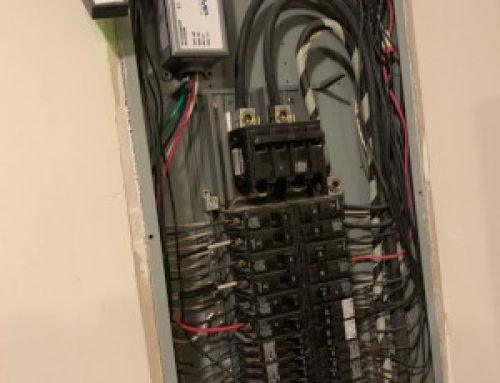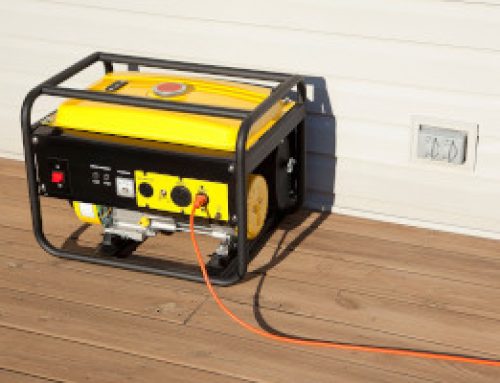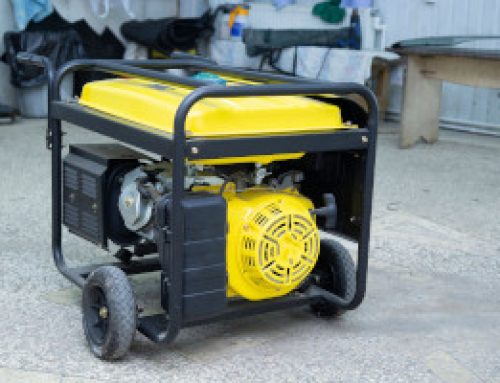When the power goes out, a generator can be a lifesaver, keeping your lights on, your refrigerator running, and your home comfortable. Whether you’re preparing for seasonal storms, frequent outages, or just want added peace of mind, installing a generator is a smart investment.
But before you jump into a purchase, it’s important to plan ahead.
Generator installation isn’t one-size-fits-all. Choosing the right type, size, fuel source, and installation location all impact cost, safety, and long-term performance.
Here’s what you need to consider before flipping the switch.
1. Finding the Best Generator Type for Your Home
Start by identifying your needs and matching them to the right type of generator:
Portable Generators
Best For: Occasional outages, limited power needs, budget-conscious homeowners
- Power Output: 3,000-12,000 watts
- Runtime: 8-12 hours on a full tank
- Installation: No permanent installation required
- Limitations: Manual startup, outdoor storage required, limited to essential circuits
Standby Generators
Best For: Automatic backup power, moderate to high power needs, convenience-focused homeowners
- Power Output: 10-22 kW (typical residential range)
- Coverage: Powers selected essential circuits automatically
- Fuel: Natural gas or propane connection
- Installation Time: 1-2 days with permits and inspections
Whole-House Generators
Best For: Large homes, families with medical equipment, business operations from home
- Power Output: 20-48 kW or higher
- Coverage: Powers entire home including HVAC, all appliances, and outlets
- Advanced Features: Smart monitoring, automatic load management, remote diagnostics
Expert Recommendation: For most homes, a 15-20 kW standby generator provides the best balance of coverage, cost, and reliability for essential circuits.
2. Calculating Your Actual Power Requirements
Proper generator sizing prevents both inadequate power and unnecessary costs. Here’s how to determine your needs:
Essential Load Calculation
Must-Have Items (typical wattages):
- Refrigerator: 600-800 watts
- Furnace blower: 800-1,400 watts
- Well pump: 1,000-2,000 watts
- Lights (LED): 100-300 watts total
- Internet/WiFi: 50-100 watts
Comfort Items:
- Window AC unit: 1,200-1,800 watts
- Electric water heater: 4,000-5,500 watts
- Washer/Dryer: 2,000-4,000 watts combined
Sizing Guidelines by Home Size
- 1,500-2,500 sq ft: 15-20 kW generator
- 2,500-3,500 sq ft: 20-24 kW generator
- 3,500+ sq ft: 24+ kW generator
Professional Load Analysis: Licensed electricians can perform precise load calculations using your actual electrical panel data, ensuring optimal generator sizing and preventing costly oversizing.
3. Understanding Critical Safety Requirements
Generator safety isn’t optional—improper installation can be deadly. Here are the non-negotiable safety requirements:
Carbon Monoxide Prevention
- Minimum clearance: 5 feet from doors, windows, and vents
- Never indoors: Garages, basements, and enclosed spaces are prohibited
- Detection required: Install CO detectors on every level of your home
Electrical Safety
- Transfer switch mandatory: Prevents dangerous backfeeding to utility lines
- Professional installation required: DIY electrical connections violate code and void warranties
- Permit and inspection: Required in most areas, typically $100-$300
Fire Safety
- Clearance requirements: 3-5 feet minimum from combustible materials
- Proper ventilation: Adequate airflow prevents overheating
- Fuel line safety: Professional gas line installation prevents leaks
- Code Compliance: Local electrical codes vary, but professional installation ensures compliance with NEC (National Electrical Code) requirements and local amendments.
4. Fuel Source & Accessibility
Your generator needs fuel to run. The best fuel type for you depends on availability, storage, and how long you expect to run the system.
- Natural Gas: Clean and convenient if your home is already connected to a gas line. Reliable and low-maintenance, but only available in certain areas.
- Propane: Clean-burning and storable, but it requires tank storage. However, propane is long-lasting and readily available
- Diesel: Powerful, often used for larger generators, but availability can be an issue. It’s less common for home systems and requires careful storage.
Also, consider how easy it is to refill or access fuel during long-term outages and learn how to properly store excess fuel.
5. Maintenance & Long-Term Costs
Generators aren’t install-and-forget devices. They need regular care to remain reliable. This means you’ll need to:
- Change the oil and filters regularly
- Check battery health and plan for battery replacements (for automatic systems
- Inspect fuel line
- Test the system periodically
Also factor in the ongoing cost of fuel, occasional repairs, and professional maintenance. Signing up for a preventative maintenance plan with your installer can help reduce long-term costs and catch issues before they lead to failure.
6. Installation Location
Generator placement affects performance, safety, and compliance:
Clearance Requirements
- 5 feet minimum from doors, windows, and air intakes
- 3 feet minimum from property lines (varies by locality)
- 36 inches minimum for service access on all sides
- 18 inches minimum above ground level (flood protection)
Site Preparation Costs
- Concrete pad: $500-$1,500 depending on size
- Electrical connections: $800-$2,000 for transfer switch and wiring
- Gas line installation: $500-$1,500 for new connections
- Permits and inspections: $200-$500
7. Warranties
Understanding warranty terms protects your investment:
Standard Warranty Coverage
Basic Coverage (2-5 years):
- Engine and alternator defects
- Control system failures
- Parts replacement
Extended Coverage (5-10 years):
- Labor costs included
- Comprehensive component coverage
- Emergency service calls
Warranty Maintenance Requirements
- Professional installation required to validate warranty
- Annual maintenance must be documented
- Authorized service providers for warranty work
- Original owner coverage: Warranties typically don’t transfer
Protection Plan Options: Extended warranties cost $500-$1,500 but can save thousands in repair costs over the generator’s 15-20 year lifespan.
8. Noise Levels and Local Regulations
Generator noise can affect your relationship with neighbors and compliance with local ordinances:
Noise Level Comparisons
- Older generators: 65-75 decibels (conversation level)
- Modern quiet models: 58-62 decibels (background noise level)
- Enclosed units: 50-55 decibels (residential quiet)
Noise Reduction Strategies
Sound Enclosures: $1,500-$3,500
- Reduces noise by 10-15 decibels
- Weather protection included
- Professional appearance
Strategic Placement:
- Position away from neighbor’s windows
- Use landscaping for natural sound barriers
- Consider prevailing wind direction
Local Regulations
- Noise ordinances: Many areas limit operation to 7 AM – 10 PM
- Decibel limits: Typically 55-65 dB at property line
- Testing restrictions: Load testing often limited to business hours
Frequently Asked Questions
Make the Right Choice for Your Home
A home generator can bring security and peace of mind during outages—but only if it’s installed and sized correctly. Whether you’re considering a small portable unit or a whole-house system, planning ahead is key.
Contact Brand Home Service today to get expert guidance on selecting, sizing, and installing the perfect generator for your home. We’ll help keep the lights on—safely and efficiently.
Call us today to schedule a consultation for generator installation in Lafayette, IN.



